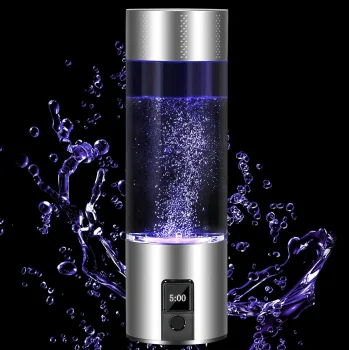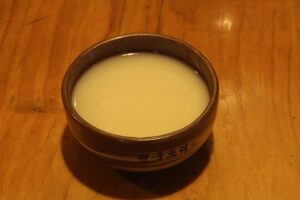 Pin
Pin Photo source: Web
You’ve probably seen it on a shelf next to coconut water and collagen shots—sleek bottles labeled hydrogen water with promises of more energy, faster recovery, and better skin. At first glance, it seems like just another health fad trying to sell you expensive water in fancy packaging. But then you start hearing whispers—athletes swear by it, some people say it clears brain fog, and others claim it makes a real difference in how they feel every day.
So what’s the deal? What is hydrogen water really, and is it actually worth your time (and money)? Or is this just another overpriced trend backed by shaky science and slick marketing?
Table of Contents
The Buzz Around Hydrogen Water—Is It Real or Just Hype?
You’ve probably seen those sleek bottles labeled “hydrogen water” popping up in stores or in some fitness influencer’s video. It’s everywhere—gyms, wellness blogs, even airports. But what is hydrogen water exactly, and why is it making so much noise in the health scene? The answer isn’t as simple as you might think.
At its core, hydrogen water is just water with extra hydrogen molecules dissolved into it. That’s it. Sounds basic, but here’s the twist: those extra hydrogen molecules are claimed to be powerful antioxidants. The idea is that they can neutralize free radicals in your body, which are often linked to aging, inflammation, and chronic diseases. So yeah, that’s why it’s buzzing.
Now, not everyone is convinced. Some say it’s just overpriced water in fancy packaging. But others swear by it, crediting it for clearer skin, faster recovery, and more energy. So what’s the truth? Let’s dig deeper.
What Science Actually Says About Hydrogen Water
Now that you know what is hydrogen water, let’s look at what research says. Is there real science backing it, or is it another wellness trend with zero substance?
Some studies—yes, actual peer-reviewed ones—suggest hydrogen water might have legit benefits. Researchers have looked into how dissolved hydrogen molecules act as antioxidants. These tiny molecules can potentially reach parts of your body where larger antioxidants can’t go, like inside cells and mitochondria. That’s a big deal if you’re into biohacking or just trying to feel better overall.
One 2010 study published in Medical Gas Research showed that people who drank hydrogen-rich water had lower markers of oxidative stress. Another study linked it to reduced muscle fatigue in athletes. But here’s the honest truth: most of these studies are small, short-term, or funded by hydrogen water companies. That doesn’t mean they’re fake, but it does mean we should stay skeptical.
So yeah, it’s promising—but not proven. More research is needed before anyone can call it a miracle drink.
How Hydrogen Water Is Made (And What You’re Really Paying For)
So now that we know what is hydrogen water and what science says about it, let’s break down how it’s actually made—and why it’s so pricey at your local health shop.
There are two main ways to make hydrogen water: using magnesium sticks or via electrolysis. Magnesium sticks react with water to create hydrogen gas. It’s simple and cheap, but it takes time and you’re never really sure how much hydrogen is in there. Electrolysis, on the other hand, uses electric current to infuse hydrogen into water. This method is more precise and often used in bottled commercial products.
The problem? Hydrogen gas doesn’t like to hang around. It evaporates fast, especially if the bottle isn’t sealed perfectly. That’s why legit hydrogen water brands use aluminum packaging or hydrogen tablets you mix on the spot.
So when you’re paying $5–$10 for a bottle, you’re not buying just water—you’re buying packaging, process, and possibly better bioavailability. Still worth it? That depends on your goals.
Who’s Drinking Hydrogen Water—and Why Athletes Swear by It
Ask around at your gym or peek into a pro athlete’s gear bag, and odds are you’ll find a bottle of hydrogen water in there. So what is hydrogen water doing in the routines of top performers and recovery junkies?
Athletes love anything that can boost recovery, reduce muscle fatigue, and increase endurance—even if the science isn’t bulletproof. Hydrogen water fits that vibe perfectly. Some runners, weightlifters, and even MMA fighters say it helps them feel less sore the day after an intense session. Others claim they bounce back faster during tournaments or back-to-back training days.
One study even found that athletes who drank hydrogen water had lower levels of lactate in their blood, which is linked to muscle fatigue. That’s why this trend isn’t just hype in the fitness community—it’s part of their toolbox, like protein shakes or foam rollers.
Is it a placebo effect? Maybe. But when recovery is key and performance matters, they’ll take any legal edge they can get.
Everyday Benefits—Can It Help With Energy, Skin, or Digestion?
You don’t have to be an athlete to wonder what is hydrogen water and if it can actually help in everyday life. A lot of regular people—office workers, students, even parents—are giving it a try for more energy, better skin, and smoother digestion.
Some users report feeling more alert and less sluggish after swapping regular water for hydrogen water. Is that because of hydration alone? Possibly. But some believe the added hydrogen helps reduce inflammation and oxidative stress, which can affect your energy levels and even your mood.
There are also stories about clearer skin, fewer breakouts, and improved digestion. The theory is that hydrogen helps reduce gut inflammation and balances out bad bacteria. Again, most of this is anecdotal—but when something simple like changing your water makes you feel better, it’s hard to ignore.
People are tired of popping pills or drinking bitter health tonics. If hydrogen water feels easier and tastes the same as regular water, why not give it a shot?
Side Effects and Myths—Is Hydrogen Water Really Safe?
After all the hype, the big question still lingers: What is hydrogen water doing to your body long-term? Is it actually safe, or are there hidden risks no one’s talking about?
The good news is, hydrogen water isn’t some weird synthetic compound—it’s just water with extra hydrogen, which is already a natural part of your body. So, as far as science currently knows, it’s considered safe to drink. There haven’t been any serious side effects reported, even when consumed daily over months.
Still, a few myths need to be cleared up. No, hydrogen water won’t cure cancer. It won’t give you superpowers, make you lose weight overnight, or replace a healthy diet. It’s also not magic water that detoxifies your body instantly—that’s mostly marketing spin.
People get into trouble when they treat it like a miracle product and ignore other health basics. So yeah, it might help you feel better, but it shouldn’t replace sleep, exercise, or real nutrition. Keep it realistic.
Hydrogen Water vs Alkaline Water—What's the Difference?
A lot of folks confuse what is hydrogen water with alkaline water, probably because both have been hyped up in health circles. But they’re not the same thing at all, and knowing the difference can save you money and confusion.
Hydrogen water is all about extra hydrogen molecules dissolved into regular water. The goal? Antioxidant effects, quicker recovery, better energy. Alkaline water, on the other hand, is about pH levels. It’s been processed to have a higher pH, which some claim helps neutralize acid in your body—though that claim has been widely debated.
The problem is that marketing often blurs the lines between the two. Some brands even sell water that’s both alkaline and hydrogen-rich, which sounds cool but can be expensive without proven added benefits.
In short: alkaline water changes pH, hydrogen water adds molecules. They target different supposed health benefits. If you’re picking one, focus on what you’re trying to improve—energy and inflammation? Go hydrogen. Gut acid issues? Maybe try alkaline.
How to Choose the Right Hydrogen Water Product
So you’ve decided to try it out. But now the shelves are packed with brands, tablets, machines, and pouches. And you’re thinking—what is hydrogen water supposed to be like, and how do I know I’m getting the real deal?
- First tip: check for packaging. Hydrogen evaporates fast, so if the water’s in a plastic bottle or isn’t sealed airtight, it probably lost most of its benefits. Go for aluminum cans, hydrogen tablets (you mix just before drinking), or pouch-style containers made for gas retention.
- Second: look for ppm (parts per million) on the label. You want at least 1.0–1.6 ppm of dissolved hydrogen for noticeable effects. If the product doesn’t list it, that’s a red flag.
- Third: avoid overpriced scams. Just because it’s expensive doesn’t mean it works better. Read reviews, especially from people using it regularly for recovery, energy, or chronic fatigue.
Hydrogen water isn’t regulated like medicine, so do your homework before buying. It’s easy to get tricked by shiny packaging and buzzwords.
DIY Hydrogen Water at Home—Does It Actually Work?
You don’t always need to spend big bucks to try what is hydrogen water for yourself. If you’re curious but not ready to go all-in on a $3 bottle or $500 machine, there are DIY options that people swear by.
Hydrogen tablets are the easiest entry point. You drop them into a bottle of water, wait a few minutes for the reaction to finish, and drink it right away. They’re portable, cheaper over time, and give you control over when the hydrogen is released—so it doesn’t have time to fade.
Another option? Magnesium sticks. These are a bit old-school and not super reliable, but some people still use them. You place the stick in water and let it sit for hours while hydrogen slowly releases. The problem is, it’s inconsistent, and the taste might change slightly.
Lastly, home hydrogen water machines exist, but they’re an investment. They use electrolysis and promise higher concentrations—but make sure you research before buying.
DIY is great, just know what you’re getting into.
Is Hydrogen Water Worth It? Real Talk
Now that we’ve explored what is hydrogen water, its science, benefits, and potential drawbacks, let’s wrap things up with the ultimate question: is it really worth the hype?
For most people, hydrogen water probably won’t revolutionize your life. It’s not a miracle cure or a magic pill for glowing skin or eternal energy. However, if you’re someone who cares deeply about antioxidants, reducing inflammation, or recovery from intense workouts, it might be worth trying.
The science behind it is still in early stages, so don’t expect instant life-changing results. But as part of a healthy lifestyle that includes balanced eating, regular exercise, and proper hydration, it could be a fun, health-boosting experiment.
In the end, hydrogen water might not be necessary for everyone, but if you’re curious and want to see if it fits into your routine, go for it. Just be aware of the price tag and the fact that, like many health trends, the long-term benefits still need more proof.
FAQs
Hydrogen water is regular water infused with additional hydrogen molecules. The extra hydrogen is believed to act as an antioxidant, potentially reducing inflammation and oxidative stress in the body. Unlike regular water, which only hydrates, hydrogen water may offer added health benefits.
Some people report feeling more energetic after drinking hydrogen water, claiming it helps with fatigue and improves alertness. This is likely due to its antioxidant properties, which may reduce oxidative stress that contributes to tiredness. However, more research is needed to confirm its effects on energy.
Yes, hydrogen water is considered safe to drink, as it’s just water with extra hydrogen dissolved into it. There are no known serious side effects from drinking hydrogen water regularly. However, it should not replace other essential health practices like eating a balanced diet or getting enough sleep.
There’s no official recommended amount for hydrogen water yet. However, many users drink one or two bottles a day, depending on their needs. As with any supplement or wellness product, it’s important to listen to your body and avoid overconsumption.
Yes, you can create hydrogen water at home using hydrogen tablets, magnesium sticks, or a home hydrogen water machine. These methods vary in effectiveness, but tablets are the easiest and most reliable option for most people. Always ensure the method you use produces an adequate level of dissolved hydrogen for optimal benefits.





























